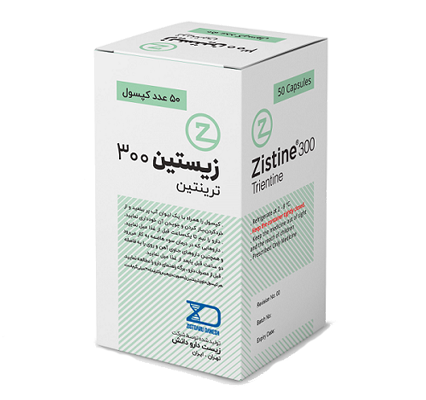1- What is Zistine?
This drug contains the active pharmaceutical substance of Trlentlne approved to treat patients with Wilson’s disease (WD). Each capsule conta ins: 300 mg Trientine (as dihydrochloride) equivalent to 200 mg Trientine base.
2- Mechanism of Action
Trientine is a chelating agent for removal of excess copper from the body.
3- Indications
Trientlne Is used Intreating patients with Wilson’s disease intolerant of ipenicillamne.
4- Dosage and Administration
The recommended dose in adu lts is 4 to 8 capsules daily in 2 to 4divided doses. The recommended dose in children aged 5 to 12 years is 2 to 5 capsules In 2 to 4 divided doses.
*Reminder:
Swallow capsules whole with plenty of water and do not crush, break or chew.
-Take the medicine half to one hour before meals.
-Take antacids.products containing metal salts and zinc two hours before or two hours after meals.
5- Dosage Form and Strength
Zistine is available in 300mg capsules for oral administration.
6- Warnings and Precautions
anemia:
Trientlne may cause iron deficiency anemia. It is, therefore, recommended to monitor the patients part cularty women under treatment.
copper deficiency:
Copper deficiency due to treatment may ocrur and cause excess liver Iron or Sideroblastlcanemla. In such cases it is recommended to titrate the dose of Trientine.
Intensified nervous system symptoms:
In starting the treatment with Trientine, there may be intenslfled nervous system symptoms. Trientine symptoms are fewer compared to penicillamine.
hypersensitivity reactions:
There are so far no reports of such reactions in patients with Wilson’s disease taking Trientine. However, there are reports of asthma, broncnitis and skin eruptions.
7- Adverse effects
Trientine main adverse effects indude:
– CNS: dystonia, myasthenia gravis, nervous system degeneration
-endocrine and metabolism: iron deficiency
-digestive : gastritis
-hypersensitivity reactions: skin problems
-neuro-musculoskeletal: muscle spasm, systemic lupusferythematous
Less than %1 adverse effects: Aplastlc anemia, low counts of all blood cells and elements, sideroblastic anemia
8- Drug Interactions
– Since Trientine can interact with other drugs, make sure to inform your doctor of the list of drugs currently taking before you start it
-Reminder: Take the medicine half to one hour before meals.
-Take antacids,products containig metal salts and zinc two hours before or two hours after meals.
Among drug interactions the following can be pointed out : antacids may reduce the absorption of Trientine and it is, therefore, recommended to observe the interval between Trientine and antacids.
– calcium salts, diuretlcs Inhibiting ca rbonic anhyd rase, salts or iron, magnesium, zinc and products containing metal salts may reduce Trientine concentration while Trientine may also lower blood the level of above mentioned drugs. Therefore, it is advisable not to take these drugs with Trientine. In case of coadministration, as it was mentioned before, consider two hours interval befo re or after taklng Trientlne.
9- Use in Specific Populations
*Pregnancy
In case you are pregnant or wish to become pregnant, you should inform your doctor about your condition before starting this drug. Trientine may cause fetal ha rm i n pregnant wo men Acco rd i ngly, women of childbearing age under treatment with th is drug should use effective contraception. Discretion and decision to continue taking Trientine in pregnancy given its benefits and risks is to be made by your doctor. Lower doses (25 percent to 50 percent of pre -pregnancy dose) should be prescribed. Babies born to mothers being treated with trientine should be monitored for serum copper and ceruloplasmin levels where appropriate.
*Nursing
There is no information regarding the amount of Trientine excreted in mother milk. However, since many drugs are excreted in mother milk, practice caution in administering Trientine while nursing. Decision to continue or stop using this drug while nursing is made by the doctor.
*Geriatrit”S
In this regard. there is not enough clinical data. To prevent adverse effects in the
elderly, it is recommended to start treatment with the minimal effective dose.
10- Overdose
In case of overdose, contact healthcare providers or poison control centers so that based on current symptoms the necessary measures can be taken.
There are so far no reports of severe poisoning with the drug.
11- Missed Dose
In case you forget to take a dose, take the missed dose as soon as you remember.
In case it is time for your next dose, skip the missed dose and take your next dose as prescribed. In general, never double up doses of Trientine capsules.
12- Storage
-Refridge rate at 2 to 8 c
-Protect from light and moisture.
-Keep the container tightly closed.
-Keep the medicine out of sight and the reach of children.
-Prescribed Only Medicine.
13- D.Nurse-Patient Helpline Team
You can contact Drugs Expert Consultation Center at 0935 220 3041-4 to get answers to your inquiries and also get to know nursing support centers in your city.Expert Consultation Center is always ready to answer the questions of our valued customers.


